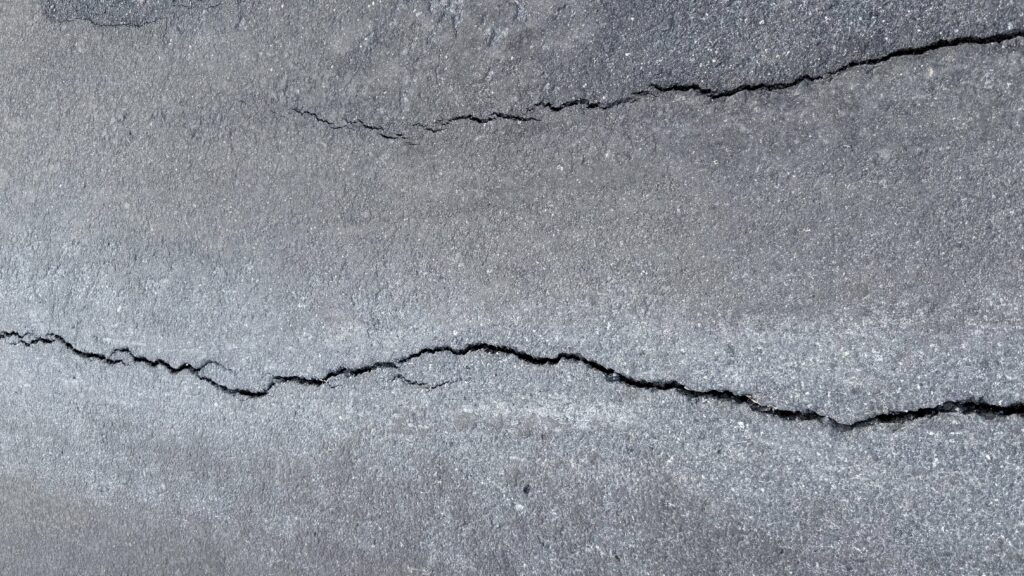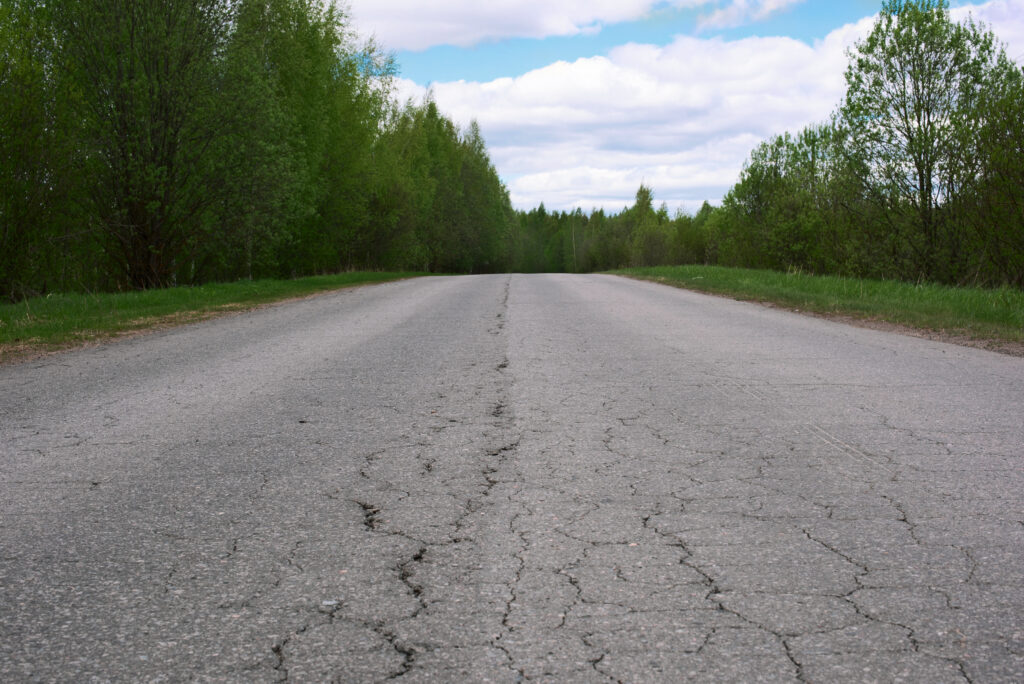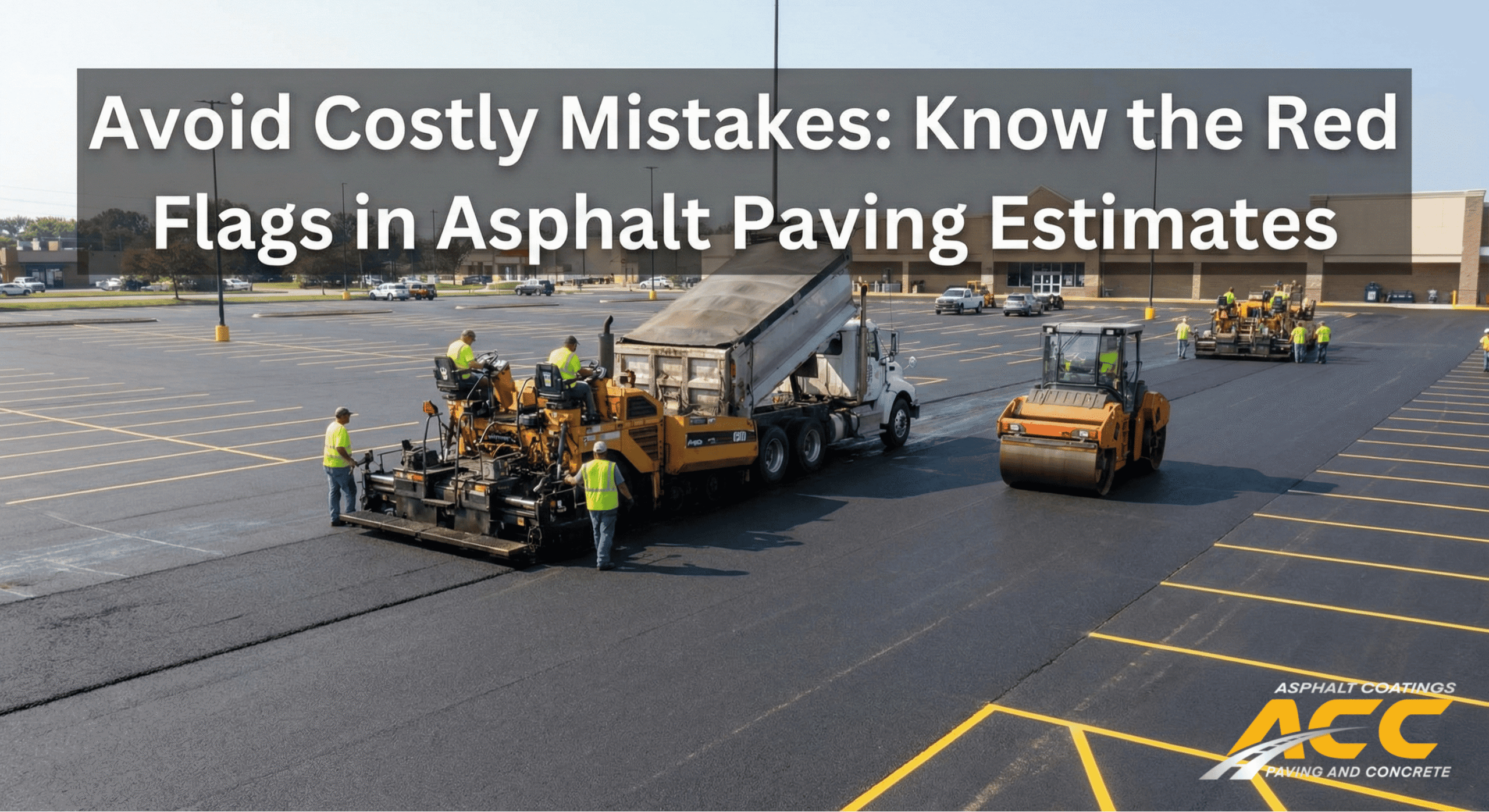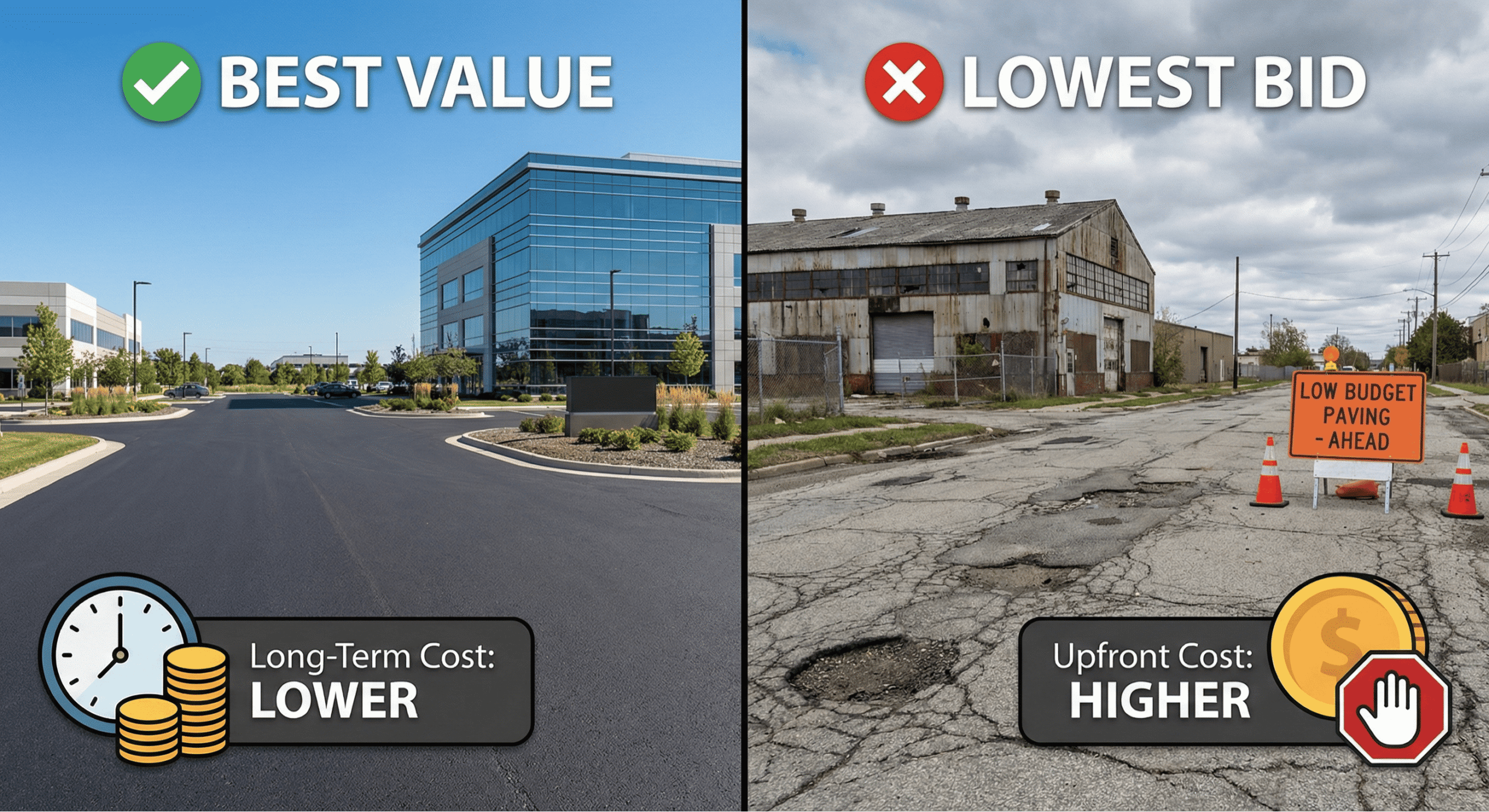
Maintaining commercial asphalt surfaces in Colorado Springs is more than routine upkeep. It is a strategic investment that impacts safety, curb appeal, and long-term costs. Harsh winter freeze-thaw cycles, heavy snow, and constant traffic can turn even small cracks into major problems. Left untreated, these fissures allow water to seep in, leading to potholes, structural failures, and the need to fix asphalt damage.
Studies show that properly executed crack sealing can reduce long-term pavement costs by about 24 percent over a 35-year period. This means that businesses acting early can save thousands of dollars and avoid operational disruptions.
In this blog, we explore what causes asphalt cracks in a mountain climate, how to select the best sealing strategies, and why timely intervention is essential to protect both your pavement and your bottom line.
How Asphalt Cracks Affect Commercial Property Safety and Costs
Cracks are the first visible signs of pavement distress. They vary in type and severity, from minor surface cracks to deep structural fissures. Common types include:
Common Types of Asphalt Cracks in Commercial Properties
Understanding the specific types of asphalt cracks helps business owners prioritize maintenance and prevent costly repairs.
- Alligator Cracks: Interconnected cracks resembling reptile skin, caused by structural failure.
- Transverse Cracks: Horizontal cracks from temperature changes and contraction.
- Longitudinal Cracks: Run parallel to the pavement, often due to traffic stress or construction joints.
- Edge Cracks: Develop along pavement edges from poor drainage or unsupported shoulders.
Cracks not only reduce pavement life but also pose safety hazards for employees, customers, and delivery vehicles. Water infiltration accelerates deterioration, increasing repair costs.
What causes asphalt cracks in Colorado Springs?
Cracks mainly result from freeze-thaw cycles, heavy commercial traffic, UV exposure, and aging asphalt. Water intrusion and poor drainage can exacerbate these effects.
Recognizing the causes early allows businesses to implement crack sealing strategies that prevent costly repairs.
Financial Implications of Ignoring Asphalt Cracks
Neglecting asphalt cracks can lead to significant financial burdens for Colorado Springs businesses. Minor fissures often expand into larger potholes, causing structural damage that may necessitate full resurfacing or complete reconstruction. In contrast, timely preventive crack sealing is a highly cost-effective strategy that protects both the pavement and your budget.
Key Financial Impacts Of Ignoring Cracks
Understanding the monetary consequences of delayed maintenance highlights why early intervention is critical.
- Increased repair costs due to extensive structural failure.
- Operational disruptions from unsafe parking lots or delivery zones.
- Potential liability claims stemming from slip-and-fall accidents or vehicle damage.
How much can businesses save with timely crack sealing?
Timely crack sealing can save businesses thousands of dollars by preventing structural damage, pothole formation, and costly resurfacing.
When to Schedule Crack Sealing for Maximum Pavement Protection
Choosing the right time for crack sealing ensures maximum effectiveness, prolongs pavement life, and prevents minor damage from escalating. Seasonal conditions play a critical role in asphalt maintenance. In Colorado Springs, spring and fall offer the most favorable conditions for crack sealing due to moderate temperatures and lower precipitation.
Sealing during cold winter months can hinder proper adhesion, while hot summer heat may cause premature softening of the sealant. Proper timing helps protect your pavement and reduces long-term repair costs.
Key Timing Considerations
To maximize the effectiveness of crack sealing, consider the following timing strategies:
- Conduct spring inspections after snowmelt to identify and address winter damage early.
- Perform fall sealing before freezing temperatures to prevent water infiltration.
- Respond promptly after heavy rainfall or extreme weather events to mitigate crack expansion..
How often should crack sealing be performed?
High-traffic commercial areas should be inspected and sealed at least once or twice per year, ideally in spring and fall. Additional inspections are recommended after major weather events.
Timing is crucial, but selecting the right sealant type and proper installation is equally important for long-term pavement preservation.
Selecting the Best Crack Sealants and Application Techniques for Colorado Springs Pavements
Choosing the right sealant and application method is critical to ensure long-lasting asphalt performance in Colorado Springs’ mountain climate. How temperature affects asphalt cracks, freeze-thaw cycles, and heavy commercial traffic place additional stress on pavements, making proper material selection and technique essential.
Using high-quality sealants with appropriate application methods reduces water infiltration, prevents crack expansion, and extends pavement lifespan, ultimately saving businesses significant repair costs.
Key Sealant Types and Their Benefits
To maintain durability and performance, it is important to understand the different types of sealants and when to use them:
- Hot-Applied Sealants: Highly flexible and durable, ideal for high-traffic commercial lots. These sealants resist deformation under heavy vehicle loads and extreme temperatures.
- Cold-Applied Sealants: Fast-curing and convenient, suitable for smaller areas or temporary repairs where immediate usability is required.
- Polymer-Modified Sealants: Superior adhesion and elasticity help prevent crack re-opening and perform exceptionally well under freeze-thaw cycles.
Best Practices for Effective Sealant Application
For optimal results, follow these key application techniques:
- Thoroughly clean cracks to remove dust, debris, and loose material for optimal bonding.
- Ensure cracks are completely dry before applying sealant to maximize adhesion.
- Maintain precise temperature control when using hot-applied sealants to avoid improper curing or bonding failures.
Caltrans’s experience indicates a typical service life of approximately 3 to 5 years for rubberized asphalt sealants used in joints and cracks, with good performance under a wide temperature range, including cold climates.
What type of sealant is best for high-traffic areas?
Hot-applied and polymer-modified sealants are most effective for high-traffic commercial pavements, providing superior flexibility and durability.
Proper materials and application techniques are critical, but partnering with experienced asphalt contractors ensures consistent results.
Expert Asphalt Contractors in Colorado Springs: Ensuring Durable Commercial Pavements

Hiring experienced asphalt contractors is essential for effective crack sealing. Skilled professionals ensure proper crack preparation, correct sealant selection, and precise application. Improper installation can lead to early failure, reduced pavement lifespan, and additional costs.
Benefits Of Professional Contractor Partnerships
Partnering with experienced asphalt contractors ensures that your crack sealing and pavement maintenance are performed efficiently, safely, and to the highest standards. Key advantages include:
- Access to trained crews familiar with mountain climate challenges.
- Use of high-quality sealants and specialized equipment.
- Assurance of consistent results across the entire commercial lot.
- Compliance with local regulations and industry standards.
Why hire professional asphalt contractors?
Professional contractors ensure proper preparation, sealant selection, and application techniques, maximizing the effectiveness and longevity of crack sealing.
Skilled contractors not only improve performance but also reduce liability risks and protect business operations.
Proven Long-Term Pavement Preservation Strategies for Colorado Springs Businesses
Crack sealing is only one part of a comprehensive pavement management strategy. Combining preventive maintenance, regular inspections, and timely repairs ensures long-lasting commercial asphalt.
Key Maintenance Strategies
These strategies focus on proactive care to extend pavement life, prevent costly repairs, and maintain a safe, professional surface for commercial properties.
- Routine inspections every spring and fall to catch early damage.
- Sealcoating to protect against oxidation and UV damage.
- Pothole repairs and minor resurfacing to prevent structural issues.
- Moisture management and drainage optimization to avoid water infiltration.
How does preventive maintenance save money?
Timely inspections and crack sealing prevent minor damage from becoming major structural issues, reducing the need for costly reconstruction.
Smart Drainage Approaches for Commercial Asphalt Longevity
Proper drainage is critical in Colorado Springs’ mountain climate. Water accumulation accelerates crack propagation, pothole formation, and base layer deterioration.
Drainage Improvement Measures Include
Implementing proper drainage techniques ensures water is effectively diverted, preventing asphalt deterioration and extending pavement lifespan.
- Installing sloped surfaces to channel water away from the asphalt.
- Cleaning and maintaining storm drains to prevent standing water.
- Using permeable asphalt in low-lying areas to enhance infiltration.
- Adding edge drains and catch basins to manage runoff.
How does poor drainage affect asphalt?
Standing water accelerates crack widening, pothole formation, and structural failure, making effective drainage essential for long-lasting pavements.
Why Timely Crack Sealing Pays Off for Colorado Springs Businesses
Investing in crack sealing early ensures commercial pavements remain durable, safe, and cost-effective. Proactive maintenance prevents minor issues from escalating into major repairs, protecting both infrastructure and business operations.
Financial advantages include
Early intervention with crack sealing offers multiple measurable benefits for commercial property owners:
- Reduced repair and resurfacing expenses.
- Minimized operational disruptions and liability exposure.
- Extended pavement lifespan, delaying the need for reconstruction.
- Improved curb appeal and safety for customers and employees.
According to industry studies cited by the Asphalt Institute, every $1 spent on timely asphalt crack sealing can yield a return on investment (ROI) of $4 to $10 in future repair cost savings. Regular crack sealing extends pavement life by 3 to 7 years by preventing water infiltration and base layer damage, which is critical in commercial settings where heavy vehicle traffic accelerates pavement deterioration.
Is crack sealing cost-effective for small businesses?
Yes, even small commercial lots save money by preventing minor cracks from developing into major, costly structural damage.
Implementing a Comprehensive Pavement Management Program
A well-designed pavement management program combines inspections, maintenance, and repair strategies. Businesses benefit from organized planning, reduced downtime, and consistent pavement performance.
Core Components Of A Pavement Management Program
A well-structured program ensures all maintenance activities are proactive, efficient, and aligned with long-term performance goals.
- Scheduled crack sealing and sealcoating.
- Regular inspections and condition assessments.
- Prioritized repair plans for high-traffic or damaged areas.
- Record-keeping and performance monitoring to track costs and lifespan.
What is a pavement management program?
It is a structured plan for inspections, maintenance, and repairs to extend pavement lifespan and reduce long-term costs.
Protect Your Investment with Timely Crack Sealing
Proactive crack sealing is essential for maintaining safe, durable, and cost-effective commercial pavements in Colorado Springs. Early intervention prevents minor damage from escalating into expensive repairs, reduces operational disruptions, and enhances curb appeal. Partnering with experienced asphalt contractors and implementing a structured pavement management program ensures lasting performance. Schedule inspections and crack sealing promptly to safeguard your business investment and avoid unnecessary expenses.
For expert crack sealing services and preventive asphalt maintenance in Colorado Springs, contact our team today to extend the life of your commercial pavement.
Frequently Asked Questions
What is crack sealing and how does it work?
Crack sealing involves filling pavement cracks with specialized sealants to prevent water infiltration, potholes, and further structural damage. It is a proactive maintenance step that extends pavement life.
How much does crack sealing cost for commercial properties in Colorado Springs?
Costs vary depending on lot size, crack severity, and sealant type, but timely crack sealing is far more cost-effective than waiting for major repairs or resurfacing.
How often should commercial asphalt be inspected for cracks?
High-traffic commercial areas should be inspected at least twice a year, ideally in spring and fall, with additional checks after major weather events.
Can crack sealing prevent all types of asphalt damage?
While crack sealing helps prevent water-related deterioration and potholes, it works best as part of a comprehensive pavement maintenance program that includes sealcoating, repairs, and proper drainage management.
Is crack sealing effective in Colorado Springs’ mountain climate?
Yes. Using high-quality, temperature-appropriate sealants and proper application techniques ensures durability even in freeze-thaw conditions and heavy traffic areas typical of Colorado Springs.



